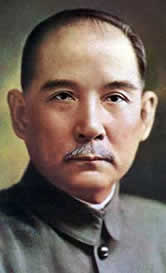K.N. Lai
Hong Kong, China
 Dr. Sun Yat-sen was born in 1866 in a small village near Macao. He learned the Chinese classics as a child and studied at American schools in Honolulu. When he returned in 1883, he became greatly troubled by what he saw as a backward China that extorted exorbitant taxes and levies from its people. Angered by this, he broke off the hand of the statue in a village temple, incurring the wrath of fellow villagers, and he fled to Hong Kong. There he studied medicine, but also took time to study non-medical subjects, reading Western history, in particular the French and American revolutions. In 1892, at the age of 26, he graduated from the newly founded Hong Kong College of Medicine, attaining honors in all but two of 12 subjects in the final examination, but also growing increasingly frustrated by the conservative Qing government’s refusal to adopt knowledge from the more technologically advanced Western nations.
Dr. Sun Yat-sen was born in 1866 in a small village near Macao. He learned the Chinese classics as a child and studied at American schools in Honolulu. When he returned in 1883, he became greatly troubled by what he saw as a backward China that extorted exorbitant taxes and levies from its people. Angered by this, he broke off the hand of the statue in a village temple, incurring the wrath of fellow villagers, and he fled to Hong Kong. There he studied medicine, but also took time to study non-medical subjects, reading Western history, in particular the French and American revolutions. In 1892, at the age of 26, he graduated from the newly founded Hong Kong College of Medicine, attaining honors in all but two of 12 subjects in the final examination, but also growing increasingly frustrated by the conservative Qing government’s refusal to adopt knowledge from the more technologically advanced Western nations.
After graduation, as an ethnic Chinese, Dr. Sun could only practice as a herbalist, because in Hong Kong his license did not receive full recognition. He first considered operating a pharmacy but in the end decided to go to Macao, where he borrowed 2000 Mexican silver dollars and established a clinic and pharmacy. His medical practice flourished. He excelled in surgery and obstetrics and became one of the most sought-after doctors in the Portuguese colony. However, he incurred the jealousy of his competitors, who invoked the Portuguese law forbidding the practice of medicine by anyone not possessing a Portuguese diploma, and was eventually ousted.
In the spring of 1893, Dr. Sun moved to Canton, where he practiced in partnership with a graduate of a Western medical school. He was now able devote more time to non-clinical pursuits, establishing liaisons among the intelligentsia and beginning to shape his ideas on reform for China. This was a time when the European nations and America had wrung large land and trade concessions in all the major seaports in China, following what has become known as the “unequal treaties.” In 1894, as Japan made further incursions and inflicted further humiliations, Dr Sun ceased practicing medicine and began to call for the abolition of the monarchy and the establishment of a republic. He left for Hawaii, subsequently travelling to Hong Kong, Japan, and California, speaking to many local Chinese organizations, and galvanizing the formation of societies dedicated to reform and revolution in China.
In October 1895, several comrades of Dr. Sun were captured while plotting a revolt in Canton. Many were executed by the imperial government. The Manchu court was now after Dr Sun; and in October 1896, during a visit to London, he was abducted and imprisoned in the Chinese Legation at Portland Place, where plans were made for his removal to China. During his days of confinement, he managed to get out a message to get help; and after some time was allowed to leave by the back door. For many years to come, spies shadowed him as he traversed the globe on his revolutionary endeavors, with a bounty on his head.
In November 1911, a cablegram was sent to London from Canton asking him to be the President of China, as a revolt had finally toppled the Manchu imperial government. Two months later, he set sail for Nanjing, becoming president of the Provisional Government of China. During the following decade, he was destined to endure much hardship and anguish as he fought the many warlords in his quest to unite the new China. He died of liver cancer in 1925 at the age of 58, and his remains were placed in a Buddhist shrine in the Western Hills a few miles outside of Beijing. Dr. Sun’s body was officially buried in a mausoleum in Nanjing in 1926.
DR. K.N. LAI is a recipient of the Priscilla Kincaid-Smith Award and Ross Bailey Lecturer Award from the Asian-Pacific Society of Nephrology. He was the president of the Hong Kong College of Physicians. He now holds the title of Honorary Professor of Medicine at the University of Hong Kong and the Chinese University of Hong Kong.
Highlighted in Frontispiece Fall 2013 – Volume 5, Issue 4
Fall 2013 | Sections | Physicians of Note

Leave a Reply